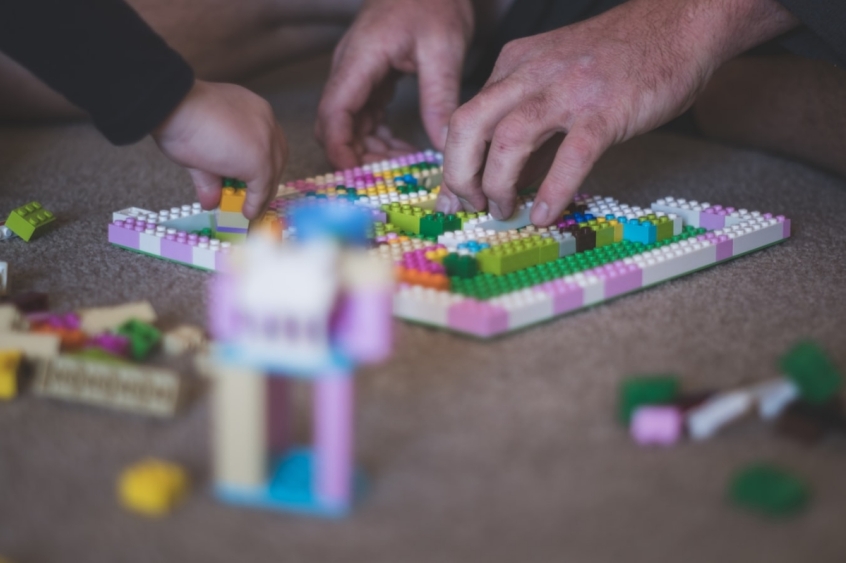
The plight of children has been a particular focus in society as a whole recently, with issues such as schooling and food poverty being brought into sharp focus by the pandemic. Paul Ringer, Deputy Chief Executive of Spurgeons Children's Charity, explores a further issue affecting hundreds of thousands of children across the country who, in the midst of the challenges of the pandemic, will not get to see their fathers this Christmas.
While you're reading this, there are 160,000 children trying to come to terms with the fact that one of their parents is in prison and they won't be together for celebrations like Christmas for some time. In fact, some believe that it's even higher than that – a recent Crest Advisory report puts the figure at 312,000, with almost 95% of those missing their father.
It can be difficult to process numbers like these, but looking beyond the figures reveals children who are struggling while a parent is behind bars. These parents are not only having to come to terms with what they've done, but many are also missing their children.
Having a parent in prison can be detrimental to a young person's wellbeing and long-term behaviour. Two thirds (65%) of boys with a convicted parent go on to offend themselves; children of prisoners are three times more likely to develop behavioural problems and twice as likely to show anti-social or delinquent behaviour.
When a parent goes to prison, it can have a significant impact on a child's emotions, education and their financial stability, affecting the very core of their existence. The sad truth is that children, through no fault of their own, can get dragged into a cycle of intergenerational crime. But it's not good enough to stand back and just accept this; we have to help families break the cycle.
Many men in prison are following in the footsteps of their own fathers and their grandfathers - this is the reality of the cycle. However, there is hope; their past does not have to dictate their future. Fathers in prison can repair and rebuild their relationships with their family, helping to prevent their children from potentially slipping into a life of crime.
At Spurgeons, we believe that maintaining and developing a father's relationship with their child is vital to successfully break the cycle of intergenerational crime. Currently, we operate in twelve prisons across the UK, running the visitors' centres and facilitating play for children during visits. We also organise family days for more trusted prisoners, which provide as near as normal an experience possible for children in a prison environment.
This support and process of building stronger family ties has proven to not only reduce reoffending (odds are 39% lower than for those who don't receive family visits), but has a significant impact on offenders' children not ending up in prison.
Unfortunately, much of this face-to-face work has come to a halt due to the pandemic. Many prisoners are confined to their cells, and since the stricter lockdown rules were enforced family visits have been cancelled. At the best of times, family relations for those in prison are fragile, but now they're stretched to breaking point. Nevertheless, we're working hard to maintain family contact through supporting supervised video calls and via more creative solutions, such as providing letter-writing packs and encouraging fathers to record bedtime stories.
One of the most significant ways we support fathers in prison is by running parenting courses and peer-to-peer mentoring, pairing more experienced fathers with those just starting on this journey. This is an incredibly effective way of encouraging fathers to reassess their values and life, but restricted interaction between prisoners has also put a halt to this.
This increased time alone may cement some fathers' desire to turn things around, however for others it could be detrimental – where feelings of loneliness, isolation and abandonment grow. In the coming weeks we're worried that too many fathers will fall into the latter. It's going to be a long winter, assessing the impact of the pandemic to these fathers and fundamentally to their children will be a huge task.
We know that Christmas can be a difficult and emotional time for families torn apart by incarceration; the pandemic will make it tougher. There is a real risk to the future of these vulnerable children – research shows that many prisoners have themselves had a problematic upbringing, growing up in situations of domestic violence, abuse, school exclusion, or in care. Having a close family member serving time in prison is recognised as being an adverse childhood experience (ACE) which significantly increases a child's exposure to possible trauma.
To encourage the bond between imprisoned fathers and their children over the festive season, Spurgeons is helping them to give presents. This personal and loving act, complete with a handwritten message, will hopefully create a treasured memory - going some way to make up for the limited or cancelled monthly visits.
While we're not trying to diminish the necessary part that prisons play in public protection and punishment, we are focused on rehabilitation and reform, helping fathers keep or form strong, lasting and positive ties with their children so that they aren't also victims of their father's crime, but instead feel supported, loved and are ultimately less likely to fall into the trap of crime.
Paul Ringer is Deputy Chief Executive of Spurgeons Children's Charity. Since qualifying as a social worker in the 1990's Paul has held senior management positions for the last 15 years within both public and voluntary sector organisations protecting children and supporting families. He joined Spurgeons in May 2012 and became the Deputy Chief Executive in 2016, where he oversees the delivery of all services to children, young people and their families and overall responsibility for safeguarding. To find out more about how you can help Spurgeons restore relationships and build brighter futures for children with a parent in prison, go to www.spurgeons.org or call 01933 417059.













